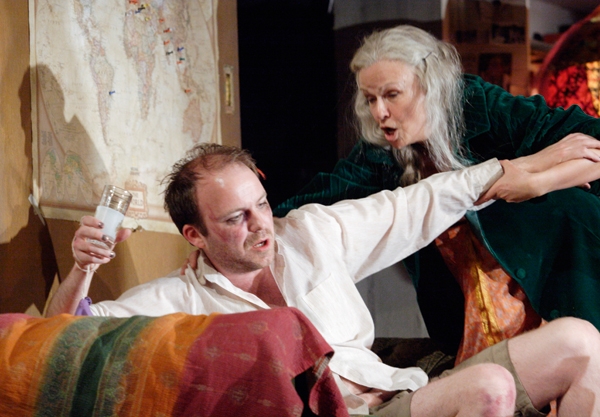This week’s opera-going afforded one example of truly great art, and one of its plausible counterfeit. To deal with the latter first: no one can deny that Billy Budd is one of Britten’s most accomplished pieces, a virtuoso exercise in the use of large orchestral forces, and in restriction to male post-pubescent singers. And musically it is done almost complete justice in the new production by English National Opera, conducted with staggering ferocity, tenderness and occasional sluggishness by Edward Gardner. The chorus was the most lusty I have heard in the past 35 years at the Coliseum, with the opening of Act II sounding like the gathering of the Gibichungs — uncannily like it, in fact.
The cast has no weak link, though the title role is not ideally taken by Benedict Nelson. The part has had some great exponents, but he won’t join their ranks; his voice isn’t open or large enough, and perhaps as compensation for that he acts with an insistent ingenuousness which can arouse momentary sympathy with Claggart. Matthew Rose gives a terrifying account of that meaty role; on the whole he is quiet, almost drugged, and he paces the stage slowly to creepy effect. Rose’s voice is now richer than ever, so his evil ‘Credo’ has every colour and a vast dynamic range. Vere, too, a much more problematic role, is strongly taken by Kim Begley, who whimpers in the Prologue and Epilogue, but otherwise sings out as a man of resolution, even if he isn’t one. I’d describe all the rest of the cast as outstanding if that weren’t a contradiction in terms. I can only mention Gwynne Howell as Dansker, Billy’s comforter; he makes every quaver tell.
David Alden’s production is standard Alden stuff, with Paul Steinberg complicit as the set designer. The slight curve of the back wall faintly suggests a nautical environment, but otherwise the sea’s only contribution is the thick mist, which has apparently invaded the sleeping quarters. Captain Vere’s cabin is white, and entered via what looks like a large tunnel; Vere himself is white too, with some gold. Oil barrels are unloaded. The chorus moves balletically, large groups making identical gestures, so that naturalism is at a discount. Insofar as any time is suggested, it is the first half of the 20th century, so a fair number of lines of text are nonsensical. The general feeling is of a prison camp, which makes Vere into an implausibly benign governor.
So is Budd to be taken as comparable to Tosca, thrilling but not something to reflect on? I can’t believe that its creators would have welcomed the comparison, and there is enough musing from the ineptly philosophical Vere to urge one to think about what he’s saying. He starts by lamenting that everything good has in it ‘some flaw, some imperfection, some defect’, but is a stammer a flaw? Certainly not a moral one, though like anything else it may lead to morally serious consequences. I’d have thought that Billy’s incapacity to see how much wickedness he is surrounded by was a far more serious defect, but that is, of course, indistinguishable from his innocence — a quality which, if he weren’t hanged so soon, would rapidly turn him into a bore.
As for the metaphysical-religious ramblings of Claggart on ‘the light [that] shines in the darkness, and the darkness comprehends it and suffers’, that is embarrassing and didn’t inspire Britten to any adequate music for characterising his anguished villain. Vere’s complacent conviction, at the end, that he has experienced ‘the love that passes understanding’ may be meant — it ought to be — ironically, but there is not the least hint that it is. Overall, as so often with Britten’s operas, the music that sets the scene, often almost onomatopoeically, is the most effective, while that which deals with the great issues that the opera professes to be at its core is empty and often verges on the perfunctory.
True greatness may need little but celebration, which is a good thing, given the constraints of word limits. Anyway, Opera North’s performance of Die Walküre, which I attended in Leeds Town Hall, is a triumph of scarcely imaginable proportions, one of the most completely successful experiences I have ever had. My only reservation is that Peter Mumford’s ‘concert staging’, lots of water and flames almost passim, can be distracting, and the projected information, part stage directions and part narration, are confusing, with the past tense used for things that haven’t yet happened.
Musically, though, the performance was nothing less than a sensation from the first bar. Richard Farnes has coaxed the enlarged Opera North Orchestra into a body responsive to every one of Wagner’s subtleties, and the range of sonority was intoxicating. The cast, too, is uniformly strong, with Kelly Cae Hogan, the substitute Brünnhilde, giving an account of her role of a calibre that I had given up hope of ever hearing again. The Valkyries — well, go to the one remaining performance and wonder. With no more space, I can only report that the Siegmund and Sieglinde, just as the Wotan, the Fricka and emphatically the Hunding, are of a standard which leaves Bayreuth far behind.






Comments